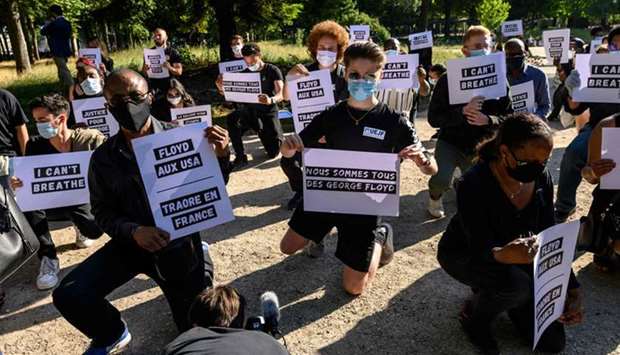The police chief of Paris yesterday defended his forces against accusations of brutality and racism as anger over alleged police violence mounts in France as in the United States.
Following a string of complaints of alleged heavy-handedness, Didier Lallement wrote a letter sympathising with the “pain” officers must feel “faced with accusations of violence and racism, repeated endlessly by social networks and certain activist groups”.
The Paris police force “is not violent, nor racist: it acts within the framework of the right to liberty for all,” he insisted in an e-mail to the city’s 27,500 law enforcers.
Lallement refused permission for a rally yesterday outside a Paris court later to call for justice for a young black man, Adama Traore, who died in police custody in 2016.
As thousands across the United States protested the police killing last week of George Floyd, an unarmed black man, Lallement expressed concern that the “tone” of the call to rally in Paris could expose a “sensitive site” to risk.
He also cited a nationwide ban on public gatherings of more than 10 people designed to hamper coronavirus spread, according to the Paris police department.
Organisers have vowed to press ahead with the protest under the banner “Truth for Adama”.
Traore, 24 was apprehended in a house where he hid after leading police on a 15-minute chase in 2016.
He lost consciousness in their vehicle and died at a nearby police station. He was still handcuffed when paramedics arrived.
One of the three arresting officers told investigators that Traore had been pinned down with their combined bodyweight after his arrest.
The case sparked violent protests in the Paris suburbs and became a rallying cry for police brutality in France, which young, black men say is often targeted at them.
Last Friday, French medical experts exonerated the three police officers, dismissing a medical report commissioned by the young man’s family that said he had died of asphyxiation.
It was the third official report to clear the officers.
Several French officers have been investigated for brutality against members of the public at long-running “yellow vests” anti-government rallies, and more recent anti-pension reform strikes.
Scores of protesters were maimed by rubber bullets or stun grenades, some losing an eye or a hand.
On January 3 this year, a 42-year-old man suffocated to death after being pinned face down to the ground during an arrest in Paris.
Last week, a 14-year-old was badly injured in one eye during a police operation in Bondy, one of Paris’s less wealthy northern suburbs, sparking protests.
Lallement insisted yesterday that any officer who erred would be appropriately punished.
“But I will not accept that individual actions throw into question the republican bulwark that we are against delinquency and those who dream of chaos and anarchy,” he wrote.
The police department in a tweet yesterday also denounced the “unacceptable, systematic questioning of police intervening in difficult contexts with hostile crowds.”

Protesters hold placards during a demonstration outside the United States Embassy in Paris yesterday.
